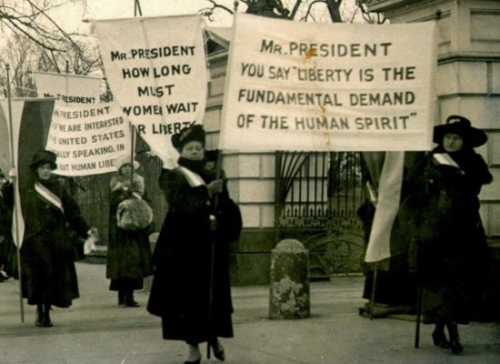I have to admit that I didn’t even know it was International Women’s Day (IWD) until my male coworkers mentioned it late in the morning. A female colleague was also oblivious to the anniversary. When I think of “women’s rights” I think of my great-grandmother, marching for women’s suffrage, or Gloria Steinem’s leadership during the Women’s Liberation Movement. But as I read more about today’s events in honor of IWD I was reminded that gender discrimination is not a thing of the past.
100 years ago, the first International Women’s Day was celebrated in Austria, Germany, Denmark, and Switzerland. In the century since, IWD celebrations have spread throughout the world–from Zambia to Afghanistan to Cambodia to Fiji. IWD events celebrate the economic, social, and political achievements that women have made in the last 100 years, but it is also an opportunity for organizations to draw attention to the pervasive gender inequalities throughout the world. Several Buddhist groups–including Buddhist Global Relief, Heart Circle Sangha, and Phap Nguyen Buddhist Congregation–have partnered with Oxfam America to organize 100 events in the U.S. this month with the goal of “raising awareness about the struggles millions of poor women still face today.” From the Oxfam press release:
“While most of us think of hunger as lack of food, it is actually lack of power. We grow enough food to feed everyone, yet hundreds of millions of women continue to go hungry. On this anniversary of International Women’s Day, we organized ourselves to not forget about these women around the world who will go to bed hungry so their family can eat instead.” In many poor countries, women are the ones who collect food, water and fuel, maintain the home and look after the children. When food is scarce, women often eat less so other family members can have enough. Most of these rural women rely on farming to earn a living. But although women produce most of the world’s food, they often lack access to vital resources, like a steady source of water or a market where they can sell their crops for a fair price. Climate change poses an added threat, with erratic rainfall and droughts that disrupt the growing season and risk further hunger. Meanwhile, women have fewer opportunities to learn new skills, access credit or find well paying jobs. Seventy five percent of the worlds 876 [million] illiterate adults are women.
This year’s IWD theme is “Equal access to education, training and science and technology: Pathway to decent work for women.” Visit the International Women’s Day website to find events in your area and check out the Huffington Post’s “5 Ways Help Empower Women” slide show. Happy International Women’s Day!

Thank you for subscribing to Tricycle! As a nonprofit, we depend on readers like you to keep Buddhist teachings and practices widely available.